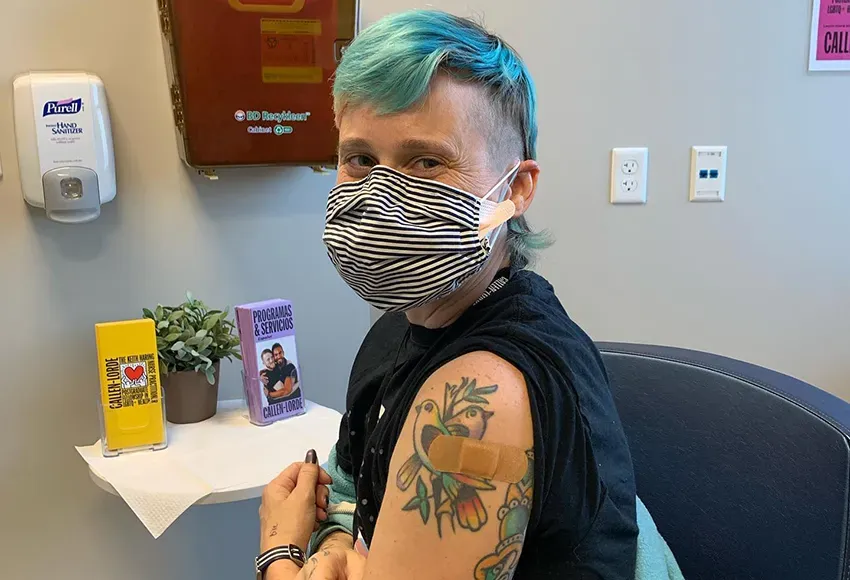On August 12, 2021, the Human Rights Campaign Foundation (HRC)–which focuses on understanding and encouraging the lives of LGBTQ+ individuals globally–released survey data showing that 92% of LGBTQ+ adults living in the United States have received at least one coronavirus vaccination dose.
The 2021 LGBTQ Community Survey, generated by the HRC Foundation, Wells Fargo and CMI Media Group, gathered data from approximately 15,000 self-identified LGBTQ+ respondents in the US. This year's version, the 15th since the survey began, is the first one to include a focus on LGBTQ+ individuals and coronavirus vaccination data.
Survey respondents reported high rates of vaccination. The percentages of those who reported receiving at least one dose of the coronavirus vaccine were:
� 93% of cisgender gay and bisexual men
� 92% of transgender and nonbinary individuals
� 92% of cisgender lesbian and bisexual women
"There are many reasons why LGBTQ+ vaccination rates may be higher than the general population, including higher percentages of the LGBTQ+ community being liberal, living in blue states, and living in urban areas," stated CMI Senior Director of Research, David Paisley. "We also see that COVID isolation significantly impacted LGBTQ+ people, which may have motivated quick vaccination to reenter the community."
LGBTQ+ community and isolation
Isolation hit members of the LGBTQ+ community particularly hard during COVID: Many inclusive spaces were shut down due to lack of funding, and individuals were unable to interact with their support systems on a consistent basis. Further, LGBTQ+ individuals have higher rates of underlying health conditions that can make them more susceptible to contracting the virus, and caution about infection may have led to further isolation.
Out of the survey respondents, 59% said COVID-19 made them feel socially isolated, while 50% said that the coronavirus pandemic has impacted their mental wellbeing. A desire to reconnect with others (as well as the world) could be a reason as to why members of the LGBTQ+ community in the US are getting vaccinated at such astonishingly high rates.
Finances? Finances! Finances.
If your financial situation hasn't been impacted by the coronavirus pandemic, consider yourself one of the lucky ones (or quit lying to yourself). A large portion of members of the LGBTQ+ community work in the service industry, which was hit hard in the spring of 2020. The economic road to recovery is a long one–let's take a look at the rates of LGBTQ+ survey respondents who were negatively financially impacted by the pandemic:
� 33% of Native American/Alaskan, Middle Eastern or North African LGBTQ+ respondents said their finances were negatively impacted.
� 26% of Asian/Pacific Islander respondents were negatively financially impacted.
� 26% of Latinx respondents were negatively financially impacted.
� 25% of Black respondents were negatively financially impacted.
� 22% of white respondents were negatively financially impacted.
There's no doubt that members of the LGBTQ+ community have struggled with the financial impact of the pandemic in the last year and a half. Strong vaccination rates may indicate a desire to reenter the workforce after job loss, and even a will to survive.
It hits close to home
The LGBTQ+ community has seen tremendous loss when it comes to those they care about the most. Out of the respondents, 21% reported that a close friend or family member had died from COVID-19 while 36% reported that a friend or family member had become extremely sick from the virus. Protecting loved ones has been a key reason for people to get the coronavirus vaccine.
Delta variant causes about 98% of new cases in WA
On August 19, 2021, the Washington state Department of Health (DOH) released new information regarding coronavirus in the state. COVID-19 cases and hospitalizations are at their highest numbers to date, and the increasing trend is predicted to continue for the next month.
"Both total beds and intensive care unit (ICU) beds occupied by COVID-19 patients have increased sharply, exceeding the previous high point of winter's third wave," stated the DOH.
Hospitalizations are becoming more frequent in younger age groups, particularly 20- to 30-year-olds, which has added to the strain on hospital staff. In addition, the DOH states that unvaccinated individuals between ages 16 and 64 are ten times more likely to be admitted to hospitals than fully vaccinated individuals in that age group.
Because of the new surge, the DOH advises unvaccinated individuals to get vaccinated immediately, in addition to taking further preventative measures. The DOH report mentions that those who gain immunity solely from a previous coronavirus infection develop only 15.5% protection from reinfection; the Pfizer vaccine, by contrast, provides 95% protection against serious illness with COVID-19. These numbers show how critical the vaccines are.
Washingtonians age five and older–regardless of vaccination status–are now required to wear a mask in indoor public spaces, in accordance with the mandate announced by Governor Jay Inslee. The DOH also strongly recommends that children ages two to four wear a mask in public spaces. The department also strongly advises that if you feel symptomatic or have a known exposure, you should get tested.
As of August 21, 2021, 66.6% of individuals in Washington state have received at least one dose of the coronavirus vaccine, while 59.4% of the population is fully vaccinated. If you're already vaccinated and wondering what you can do, talk to friends and family members who aren't vaccinated about getting vaccinated–especially your straight friends. Help schedule their appointments, drive them to the appointments and redirect all questions they may have to their healthcare providers.


